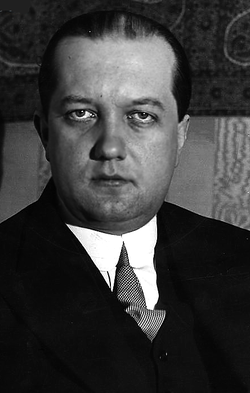
Józef Lipski
Encyclopedia

Nazi Germany
Nazi Germany , also known as the Third Reich , but officially called German Reich from 1933 to 1943 and Greater German Reich from 26 June 1943 onward, is the name commonly used to refer to the state of Germany from 1933 to 1945, when it was a totalitarian dictatorship ruled by...
, 1934 to 1939. Lipski played a key role in foreign policy
Foreign policy
A country's foreign policy, also called the foreign relations policy, consists of self-interest strategies chosen by the state to safeguard its national interests and to achieve its goals within international relations milieu. The approaches are strategically employed to interact with other countries...
of Second Polish Republic
Second Polish Republic
The Second Polish Republic, Second Commonwealth of Poland or interwar Poland refers to Poland between the two world wars; a period in Polish history in which Poland was restored as an independent state. Officially known as the Republic of Poland or the Commonwealth of Poland , the Polish state was...
.
Life
Lipski trained as a lawyer, and joined the Polish Ministry of Foreign Affairs in 1925.One of his first assignments in 1934 was work on the German-Polish Non-Aggression Pact
German-Polish Non-Aggression Pact
The German–Polish Non-Aggression Pact was an international treaty between Nazi Germany and the Second Polish Republic signed on January 26, 1934. In it, both countries pledged to resolve their problems through bilateral negotiations and to forgo armed conflict for a period of ten years...
.
Lipski met with German Foreign Minister Joachim von Ribbentrop
Joachim von Ribbentrop
Ulrich Friedrich Wilhelm Joachim von Ribbentrop was Foreign Minister of Germany from 1938 until 1945. He was later hanged for war crimes after the Nuremberg Trials.-Early life:...
at Berchtesgaden
Berchtesgaden
Berchtesgaden is a municipality in the German Bavarian Alps. It is located in the south district of Berchtesgadener Land in Bavaria, near the border with Austria, some 30 km south of Salzburg and 180 km southeast of Munich...
, Hitler's mountain retreat, on 24 October 1938. Ribbentrop demanded that Poland agree to German annexation of Free City of Danzig
Free City of Danzig
The Free City of Danzig was a semi-autonomous city-state that existed between 1920 and 1939, consisting of the Baltic Sea port of Danzig and surrounding areas....
; Lipski refused. According to AJP Taylor, just days before the German invasion of Poland, Lipski refused to get out of bed, despite the urging of British diplomats, to meet with von Ribbentrop to hear Germany's latest demands of Poland. The anecdote illustrates the attitude of Józef Beck
Józef Beck
' was a Polish statesman, diplomat, military officer, and close associate of Józef Piłsudski...
towards Hitler's tactic of making demands and raising the stakes: Poland would not play that game. Under British pressure to negotiate a solution to the Danzig crisis
Polish Corridor
The Polish Corridor , also known as Danzig Corridor, Corridor to the Sea or Gdańsk Corridor, was a territory located in the region of Pomerelia , which provided the Second Republic of Poland with access to the Baltic Sea, thus dividing the bulk of Germany from the province of East...
, Lipski eventually phoned to ask for an interview with Ribbentrop on 31 August 1939, but upon learning that Lipski would be present only as an ambassador, rather than as a plenipotentiary
Plenipotentiary
The word plenipotentiary has two meanings. As a noun, it refers to a person who has "full powers." In particular, the term commonly refers to a diplomat fully authorized to represent his government as a prerogative...
, the meeting was refused. Poland was invaded the next day. According to Taylor, the Germans were aware of Lipski's limited negotiating authority.
During the Second World War, Lipski fought as a volunteer (Polish 1st Grenadiers Division in France) and later joined the General Staff of Polish Armed Forces in the West
Polish Armed Forces in the West
Polish Armed Forces in the West refers to the Polish military formations formed to fight alongside the Western Allies against Nazi Germany and its allies...
. In 1951 Lipski moved to the USA and represented the Polish Government in Exile
Polish government in Exile
The Polish government-in-exile, formally known as the Government of the Republic of Poland in Exile , was the government in exile of Poland formed in the aftermath of the Invasion of Poland of September 1939, and the subsequent occupation of Poland by Nazi Germany and the Soviet Union, which...
.

